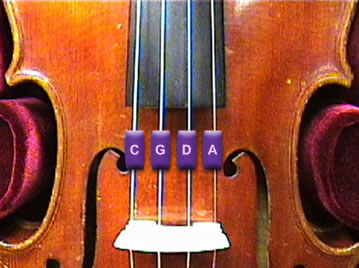


If you put your finger down on one string you get the next note on the scale. so one finger down on the D string is E and two fingers is F, etc. Unlike a guitar, you can't play a chord using multiple strings at a time, you can only play one string at a time. To actually play the note you have to run the bow hairs across the string. You hold the viola under your chin and with your left hand and you hold the bow with the right hand, regardless of what hand you write with.

You need to make sure not to push down to hard on the string, or else you could hurt the viola strings. Playing too rough can be indicated by the sound not coming out smoothly but rather sounding really rough. And playing lightly can be indicated by not enough sound coming out of the instrument.
If you've ever played an instrument before, you probably recognize this:
 this is a treble clef, otherwise known as a G Clef. Most instruments read music in this clef. The viola does not. The viola reads in Alto clef which looks like this:
this is a treble clef, otherwise known as a G Clef. Most instruments read music in this clef. The viola does not. The viola reads in Alto clef which looks like this: Viola is the only instrument that reads in this clef. I personally feel like every instrument should read in this clef. In my opinion, it's much easier to read and keep your place in the music relative to middle C Middle C lies directly in between the two bumps of the "B." But on the treble clef middle C lies below the staff. This difference between the treble and alto clef is one of many differences between the viola and the violin.
Viola is the only instrument that reads in this clef. I personally feel like every instrument should read in this clef. In my opinion, it's much easier to read and keep your place in the music relative to middle C Middle C lies directly in between the two bumps of the "B." But on the treble clef middle C lies below the staff. This difference between the treble and alto clef is one of many differences between the viola and the violin. Everybody thinks that they're virtually the same instrument but they're not. A violin has 4 strings, but it's strings are G, D, A, and E. So most of the strings are the same, but the viola has a low string that the violin doesn't, and the violin has a high string that the viola doesn't have. The viola is also slightly larger than it's treble clef'd counterpart. So if somebody who has played viola their whole life tries to play violin, they would probably understand the general feeling of the instrument but definitely won't be able to read the music.
Everybody thinks that they're virtually the same instrument but they're not. A violin has 4 strings, but it's strings are G, D, A, and E. So most of the strings are the same, but the viola has a low string that the violin doesn't, and the violin has a high string that the viola doesn't have. The viola is also slightly larger than it's treble clef'd counterpart. So if somebody who has played viola their whole life tries to play violin, they would probably understand the general feeling of the instrument but definitely won't be able to read the music.I hope this helped some of you understand the very basics of the viola a little more than you did prior. Since there isn't really a video that I could show you that would say it any differently than I did, i'm going to end this with a video of a piece of music for beginner viola and violin students. One that I had to play in the 5th grade:



